Why Clearing a Clogged Drain Quickly Matters
When water starts pooling in your sink or shower, you're facing one of the most common household plumbing problems. A clear clogged drain is essential to prevent water damage, foul odors, and bigger plumbing issues down the road.
Quick Solutions to Clear a Clogged Drain:
- Boiling Water: Dissolves grease and soap buildup.
- Baking Soda & Vinegar: A natural fizzing action breaks up debris.
- Plunger: Uses pressure to dislodge minor clogs.
- Drain Snake: Physically removes hair and deeper blockages.
- Call a Professional: For recurring clogs or issues affecting multiple drains.
The main culprits are often hair in showers and grease and food particles in kitchen sinks. Most clogs can be cleared with simple DIY methods, but knowing when to call a professional can save you time, money, and potential pipe damage.
For Bridgeville area homeowners, addressing clogs quickly keeps your plumbing system running smoothly. Many clogs are surprisingly easy to fix once you know the right approach.
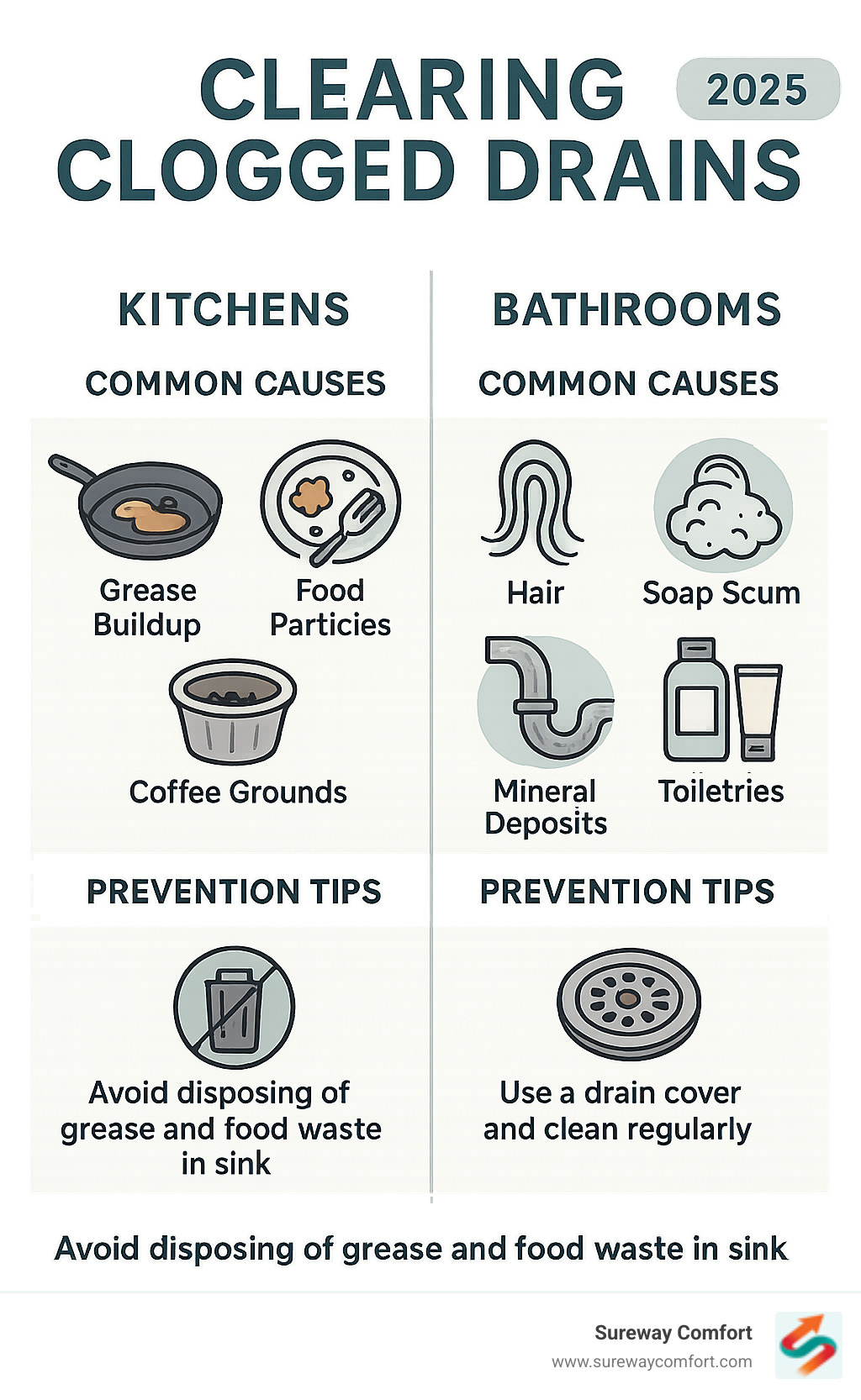
Understanding Your Clog: Common Causes and Telltale Signs
Before you can clear clogged drain issues, you need to identify the problem. Look for these telltale signs that your drain is sending out an SOS:
- Slow Draining Water: This is often the earliest hint that a clog is forming.
- Gurgling Sounds: Trapped air trying to escape past a blockage causes strange bubbling or gurgling noises.
- Foul Odors: Decaying food, soap scum, or hair stuck in the pipes can create unpleasant smells.
- Water Backing Up: If water fills your sink, shower, or toilet—especially when using another fixture—you have a serious clog, possibly in your main sewer line.
Common Causes of Clogs:
- Kitchen Clogs: Usually caused by grease buildup and food particles. Cooking oil, coffee grounds, and leftover food can solidify and create stubborn blockages.
- Bathroom Clogs: Hair is the primary offender, tangling with soap scum to form webs that trap debris. Mineral buildup from hard water can also contribute.
- Main Line Issues: If multiple drains are affected, the problem could be in your main sewer line. Tree roots growing into older pipes are a common and serious cause that requires professional help.
Identifying the Clog Location and Severity
To choose the right solution, determine the clog's location and severity.
- Single vs. Multiple Drains: A single slow drain points to a localized clog. If many drains are slow, especially on lower levels, it suggests a main sewer line blockage.
- Partial vs. Full Blockage: A slow drain is a partial blockage. If water doesn't drain at all, it's a full blockage that is more urgent to fix.
- Simple vs. Stubborn Clogs: Simple clogs are near the drain opening and easy to fix. Stubborn clogs are deeper, more solidified, or caused by foreign objects, often requiring professional help.
For clogs that won't budge in the Scott Township area, our team is ready to help. If you're unsure about the clog's location or severity, it's always safest to call an expert. Clogged Drain Services in Scott Township, PA
Step-by-Step DIY Methods to Clear a Clogged Drain
Most household clogs can be tackled with simple DIY methods. We'll start with the easiest and progress to more advanced techniques. Always wear protective gloves when dealing with drain water. Let's clear clogged drain issues together!
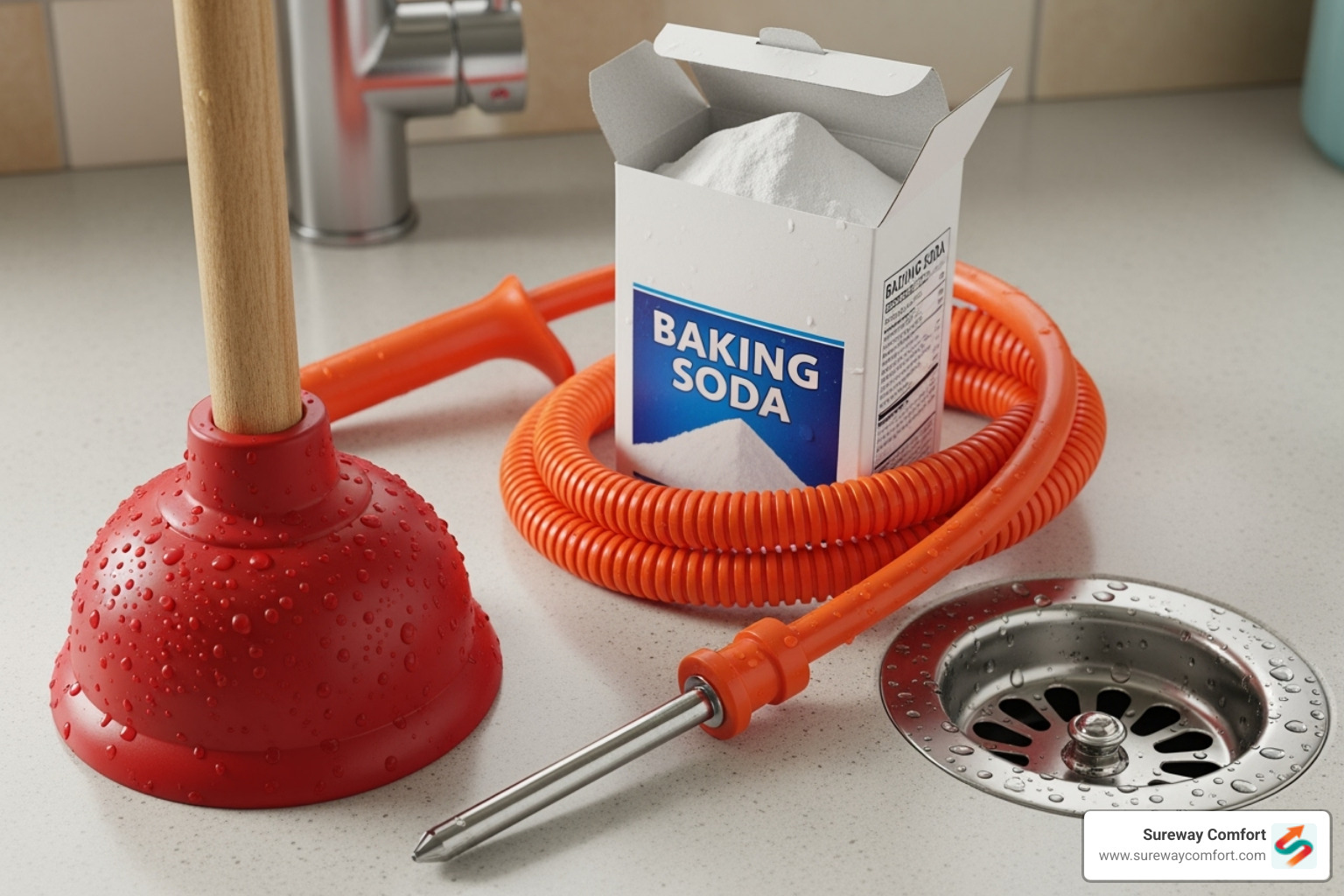
Method 1: Boiling Water for Grease and Soap
This method is effective for minor clogs caused by grease and soap scum. Hot water dissolves fatty substances, much like it cleans greasy dishes.
Carefully pour a large pot of boiling water slowly down the drain. Wait 10-15 minutes, then flush with hot tap water to clear the loosened clog. You may need to repeat this process for tougher clogs.
A Quick Word on PVC Pipes: Extremely hot water can sometimes soften older PVC pipes. If you have concerns, let the water cool slightly before pouring or try another method. For any plumbing concerns in the Bridgeville area, don't hesitate to reach out. Plumbing Services in Bridgeville, PA
Method 2: The Baking Soda and Vinegar Fizz
This classic natural remedy is great for breaking up minor clogs with a chemical-free fizzing action.
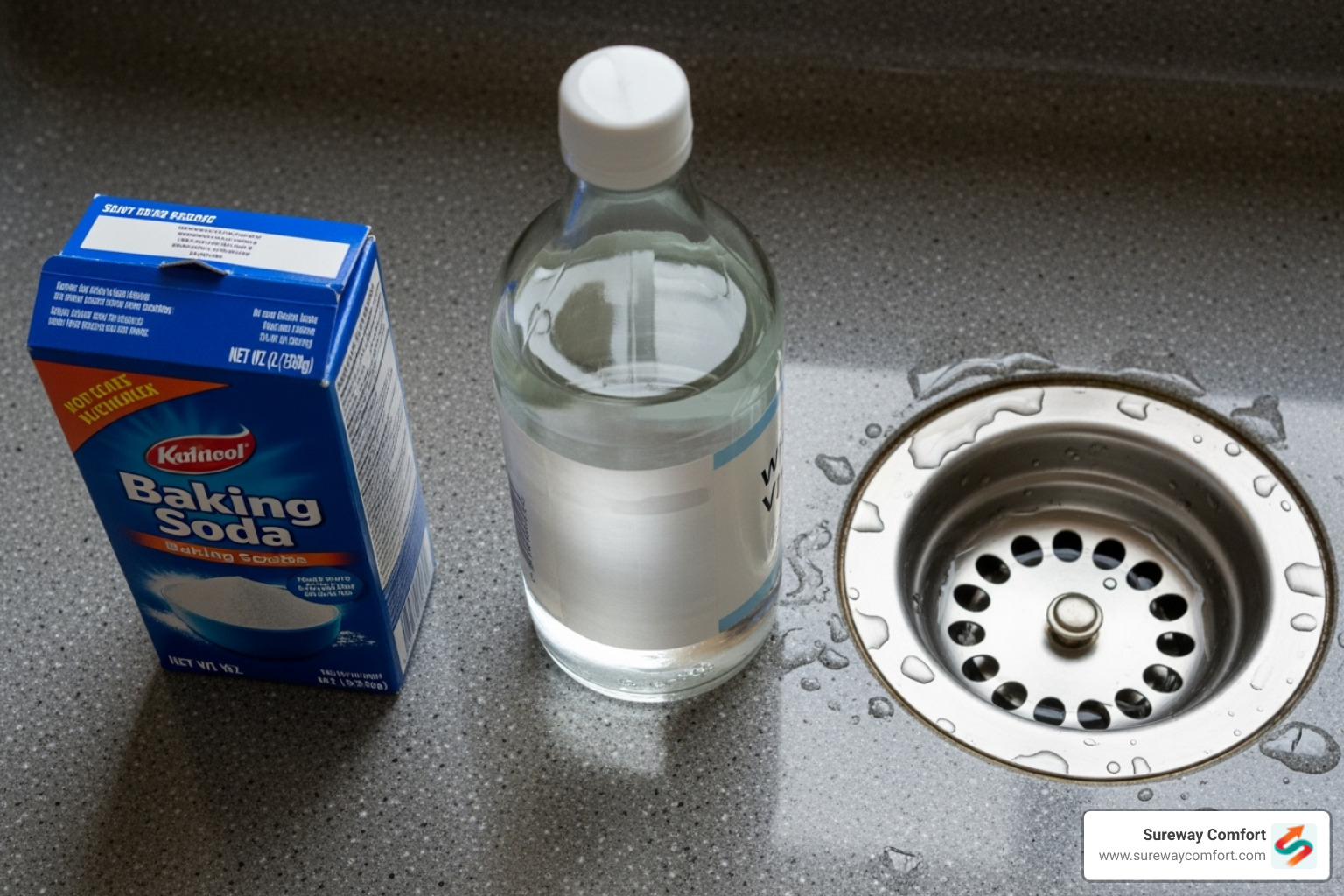
The reaction between baking soda (a base) and vinegar (an acid) creates carbon dioxide gas, which physically agitates and loosens the clog. Scientific explanation of the reaction
- Clear Standing Water: Remove as much as you can.
- Add Baking Soda: Pour about 1 cup of baking soda down the drain.
- Add Vinegar: Follow with 1 cup of white vinegar.
- Cover and Wait: Cover the drain with a stopper and wait 15-30 minutes.
- Flush: Flush the drain with hot water.
This method works best on grease and soap scum, but not on hair or solid objects.
Method 3: How to Properly Use a Plunger to Clear a Clogged Drain
The plunger uses water pressure to dislodge many common clogs. Using it correctly is key.
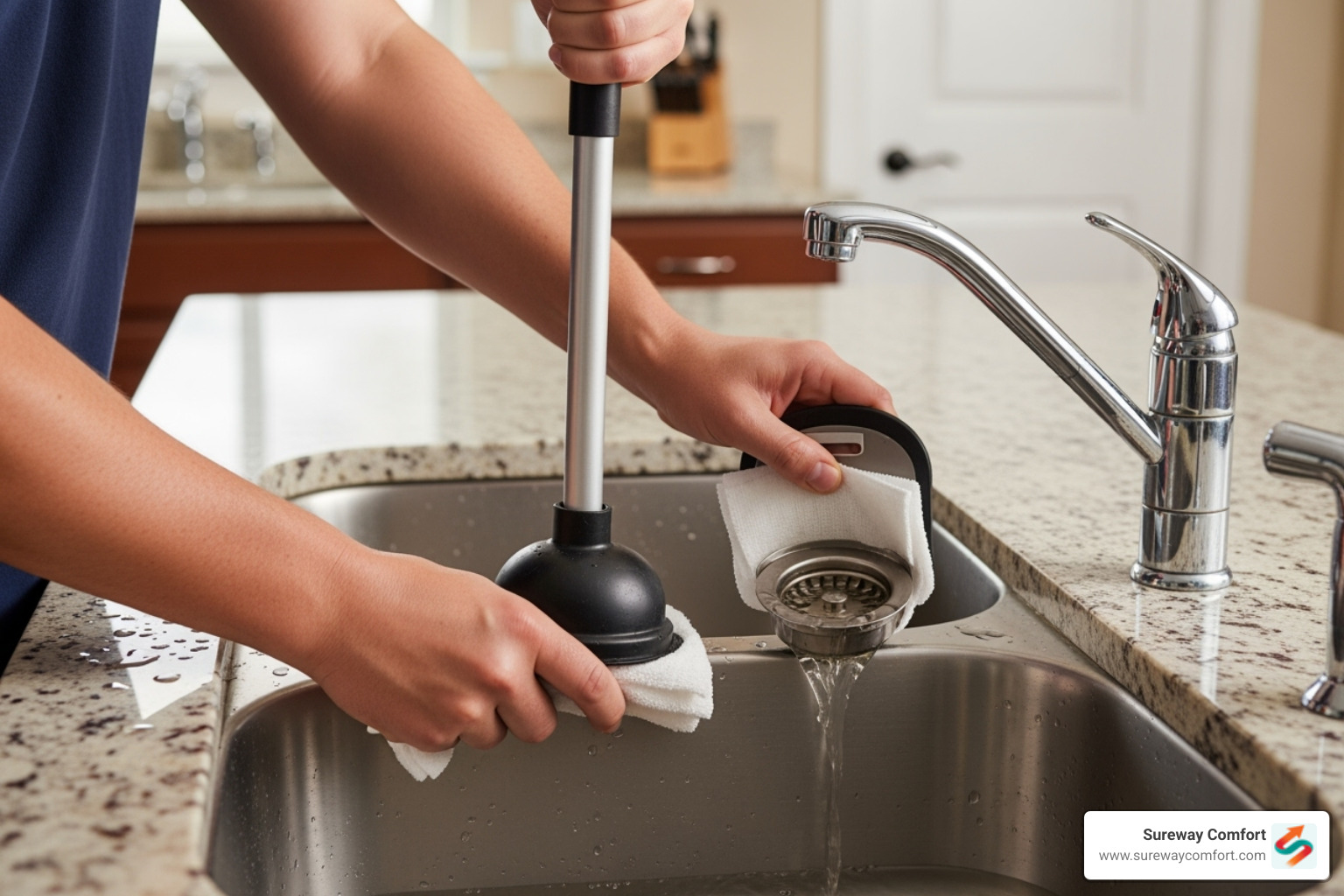
Use a cup plunger for sinks and tubs and a flange plunger for toilets. A good seal is essential for creating pressure.
- Add Water: Ensure there's enough water in the sink or tub to cover the plunger's cup.
- Create a Seal: Place the plunger firmly over the drain opening.
- Block Overflow: Use a wet rag to block the overflow opening on sinks and tubs to maximize pressure.
- Plunge: Push and pull with a steady, strong rhythm for 15-30 seconds to create a vacuum effect.
- Check and Repeat: Remove the plunger to see if water drains. If not, repeat the process.
Method 4: Using a Drain Snake for Tougher Blockages
When other methods fail, a drain snake (or plumbing auger) can physically break through or retrieve stubborn clogs like hair.
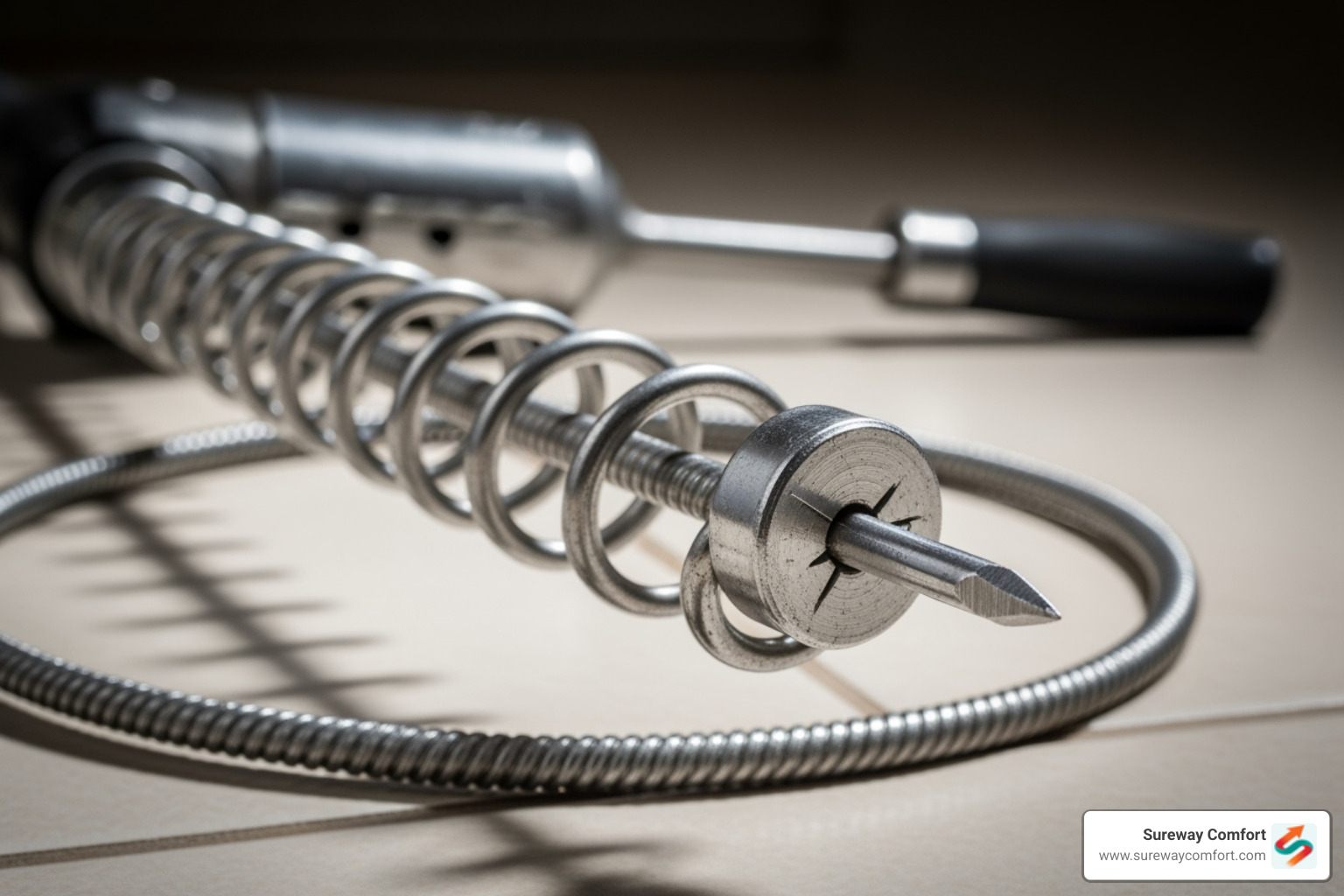
A manual drain snake is a long, flexible metal cable with a corkscrew tip. It's used for clogs that are too deep or solid for other methods.
- Prepare: Place towels or a bucket under the drain to catch debris.
- Access the Drain: Remove the drain stopper. For sinks, you may need to access the P-trap.
- Feed the Cable: Slowly push the snake into the drain until you feel resistance.
- Work the Clog: Tighten the lock screw and crank the handle clockwise to bore into or hook the clog.
- Retrieve the Clog: Slowly pull the snake back out of the drain.
- Flush: Run hot water for several minutes to clear any remaining debris.
Using a drain snake can be tricky. If you're unsure or the clog is very stubborn, it's safer to call a professional to avoid pipe damage. Our team offers expert drain snaking services in Bridgeville, PA. Drain Snaking Services in Bridgeville, PA
Natural vs. Chemical Cleaners: What's Best for Your Pipes?
When facing a clog, it's tempting to grab a chemical drain cleaner. However, it's important to understand the pros and cons of chemical versus natural and mechanical methods.
| Feature | Natural Methods (Baking Soda/Vinegar, Boiling Water) | Caustic Chemical Cleaners (e.g., Drano, Liquid-Plumr) |
|---|---|---|
| Safety | Low risk; non-toxic | High risk; toxic, can cause burns, fumes |
| Pipe Compatibility | Safe for most pipes (caution with boiling water on old PVC) | Can damage PVC, older metal pipes, and seals |
| Effectiveness | Best for minor clogs, grease, soap scum, maintenance | Can dissolve organic matter; often ineffective on severe clogs |
| Environmental Impact | Minimal | Harmful to waterways and aquatic life |
| Cost | Very low (common household items) | Moderate to high |
| Speed | Can take 15-30 minutes or longer | Can be faster for some clogs |
| Mechanism | Physical agitation, dissolving, flushing | Chemical reaction (heat, gas, dissolving) |
The Risks of Caustic Chemical Drain Cleaners
Chemical drain cleaners pose significant risks. The harsh chemicals (like lye or acid) generate intense heat that can warp PVC pipes and corrode older metal pipes, potentially turning a clog into a costly leak. The chemical reaction also produces toxic fumes that are dangerous to inhale and can cause severe burns on contact, making them a hazard for children and pets.
Furthermore, these cleaners often fail on tough clogs. If they don't work, you're left with a sink full of corrosive chemicals, creating a dangerous situation for anyone who has to work on the drain next. For a safer approach, see How Professionals Handle Clogged Drains.
Benefits of Natural and Mechanical Methods
Choosing natural and mechanical methods to clear clogged drain issues is a smarter, safer choice. They are eco-friendly, as ingredients like baking soda and vinegar are biodegradable. They are also safe for your pipes, preventing the corrosion and damage caused by harsh chemicals.
These methods are highly cost-effective, using common household items or affordable, reusable tools like a plunger or drain snake. Most importantly, mechanical tools physically remove the blockage, providing a more thorough and lasting solution. This approach ensures a healthier home without toxic fumes or dangerous chemicals. For reliable and safe drain cleaning in Upper St. Clair, PA, our team is ready to help. Drain Cleaning Services in Upper St. Clair, PA
Proactive Prevention: Keeping Your Drains Flowing Freely
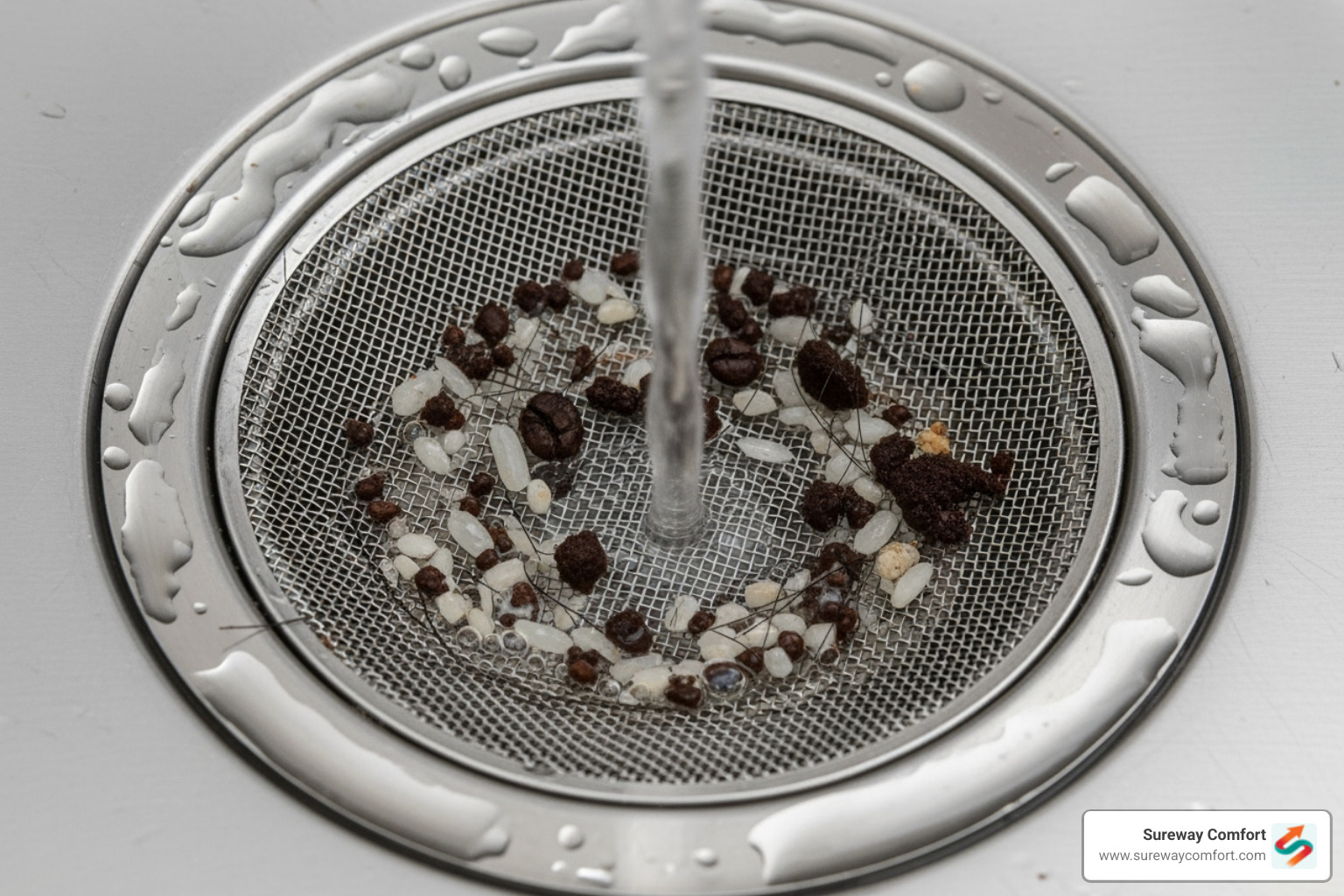
Preventing clogs is a key step toward a more efficient plumbing system. According to the US Environment Protection Agency report on water waste from leaks, even small plumbing issues can contribute to significant water waste.
Preventative Tips to Avoid Clogged Drains
Keep your pipes flowing freely with these top tips:
- Use Drain Screens: Place mesh screens or strainers over all sink and shower drains to catch hair, food particles, and soap scum. Clean them regularly.
- Scrape Food Scraps: Scrape plates into the trash or compost bin before rinsing. Even with a garbage disposal, large amounts of food can cause clogs.
- Avoid Pouring Grease Down the Drain: Pour cooled cooking oil and grease into a disposable container and throw it in the trash. Grease solidifies in pipes and acts like glue for other debris.
- Run Hot Water Regularly: After using the kitchen sink, run hot water for 10-15 seconds to flush away lingering particles and keep grease from hardening.
- Do a Monthly Baking Soda Flush: A monthly flush with baking soda and vinegar can break down minor buildup and keep drains fresh.
- Be Mindful of What You Flush: Only flush human waste and toilet paper. Never flush cotton balls, Q-tips, paper towels, feminine hygiene products, or so-called "flushable" wipes, which can all cause serious blockages.
When DIY Isn't Enough: Signs You Need a Professional Plumber
While DIY methods are effective for many clogs, some situations require a professional. Trying to fix a major issue yourself can lead to more expensive problems. Knowing when to call for backup is key.
Here are the signs it's time to let a professional plumber clear clogged drain issues:
- Recurring Clogs: If the same drain clogs repeatedly, there's likely a deeper problem that DIY tools can't reach.
- Multiple Drains Affected: Clogs in several fixtures at once strongly indicate a main sewer line blockage, which requires specialized equipment.
- Severe Blockage: If water is completely backed up and won't drain at all, the clog is too stubborn for home remedies.
- Foul Sewer Gas Odor: A persistent smell of sewage can point to a serious main line clog or a damaged pipe, which can be a health hazard.
- DIY Failure: If you've tried all the appropriate DIY methods without success, it's time to call in an expert to avoid damaging your pipes.
For residents in Bridgeville, PA, and surrounding areas, our technicians are equipped to handle any drain challenge, including advanced solutions like hydro jetting. Learn more about our Hydro Jetting Solutions.
Advanced Solutions Professionals Use
Professional plumbers use specialized tools to resolve tough clogs effectively.
- Professional Drain Snakes (Augers): These are longer, more powerful, and often motorized compared to manual versions. They can cut through tough blockages like tree roots deep within your plumbing.
- Hydro Jetting: This method uses high-pressure water streams to blast away grease, scale, roots, and other debris. It doesn't just clear the clog; it thoroughly cleans the pipe walls, preventing future buildup.
- Video Camera Inspection: A small, waterproof camera is fed into your pipes to pinpoint the exact location and nature of the clog. This technology eliminates guesswork and helps identify underlying pipe damage.
These advanced techniques ensure the clog is completely removed, leaving your pipes clean and free-flowing. For professional hydro jetting services in Bridgeville, PA, our team has the expertise to get the job done right. Hydro Jetting Services in Bridgeville, PA.
Frequently Asked Questions about Clearing Clogged Drains
Here are quick answers to some common questions about how to clear clogged drain issues.
How often should I clean my drains as a preventative measure?
For preventative maintenance, a monthly flush using baking soda and vinegar is a great habit. This gentle action helps break down minor buildup and control odors. For kitchen sinks, running hot water for 15 seconds after washing dishes helps flush away grease and food particles. Always use drain screens and clean them regularly to catch debris before it enters the pipes.
Can I use a chemical cleaner if I have a septic system?
No. Septic systems rely on beneficial bacteria to break down waste. The harsh chemicals in most commercial drain cleaners can kill these essential microbes, causing your septic system to fail. Stick to natural methods like baking soda and vinegar, plunging, or using a drain snake. You can also look for enzymatic drain cleaners specifically labeled as safe for septic systems.
What's the difference between a drain snake and a drain auger?
In most cases, the terms "drain snake" and "drain auger" are used interchangeably to describe the flexible cable tool used to physically clear a clog. Technically, the "auger" is the corkscrew-like tip that bores into the blockage. For homeowners, a manual drain snake is the common tool. Professionals may use a more powerful, motorized version sometimes referred to as a power auger. Both are mechanical tools designed to physically remove the problem.
Let the Water Flow Freely Again
Dealing with a clogged drain is frustrating, but you are now equipped with the knowledge to clear clogged drain issues yourself. From the fizz of baking soda and vinegar to the power of a plunger or drain snake, these simple methods can resolve many common blockages.
Prevention is the best strategy. Using drain screens, properly disposing of grease, and performing a monthly baking soda flush can keep your pipes flowing freely and save you from future headaches.
While DIY is empowering, some jobs are best left to the experts. If you're facing recurring clogs or a blockage affecting multiple drains, it's time to call for professional help. That's where we come in.
For persistent clogs or emergency plumbing needs in the Bridgeville, PA area, trust the experienced technicians at Sureway Comfort. We proudly serve homeowners across Bridgeville, South Fayette, Upper St. Clair, Mt. Lebanon, McDonald, Scott Township, Canonsburg, and Bethel Park.
Ready to let the water flow freely again?



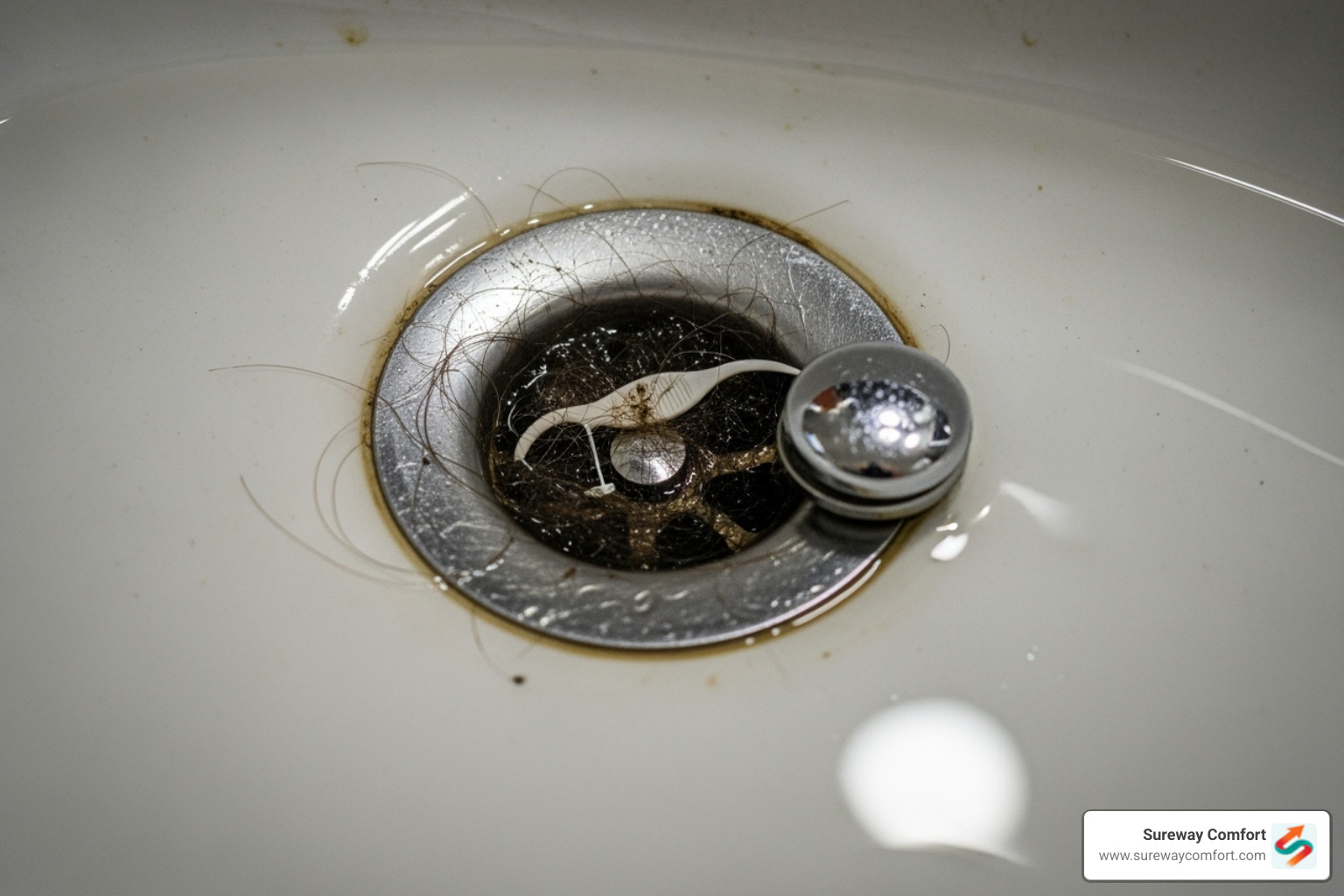



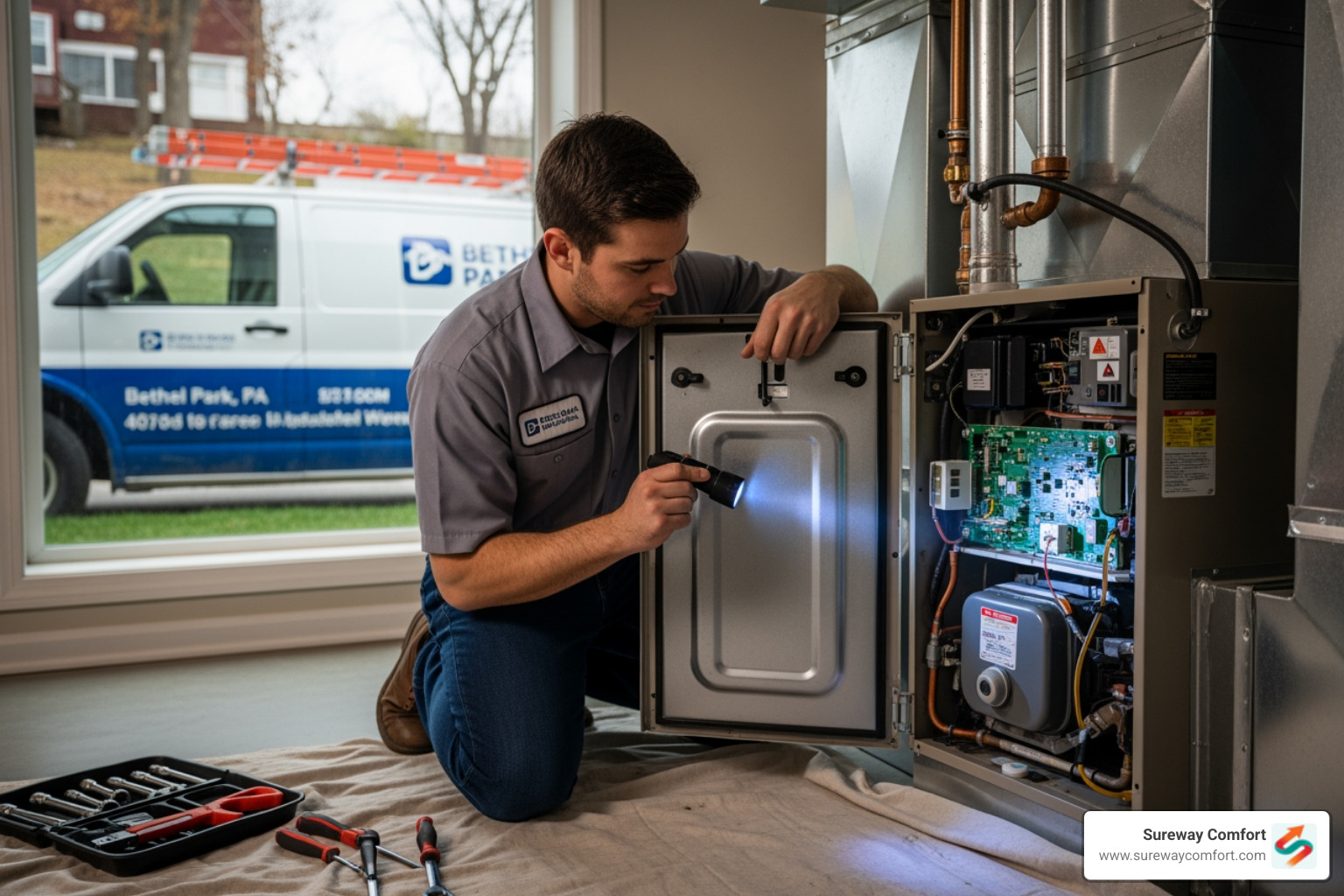




















.avif)



